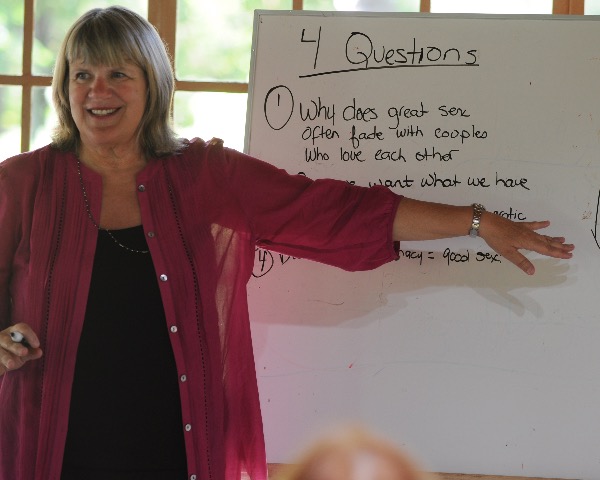
Oct. 16, 2014
Vol. 12, Issue 18
As we’re in the midst of the cycle of change into autumn; nature shows off her colors and abundance in the bounty of the harvest. Then as the leaves fall from glory to the ground, we’re reminded again of the cycles of change — the leaves turn brown, crumble underfoot, and go on to renew the cycle.
My friend and speaker, Linda Carroll, MS, reminds us in her new book, Love Cycles, that relationships also move in cycles. Love is not a trajectory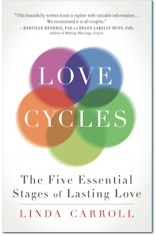 — it’s more like a spiral that moves up and down. It’s not the fairy tale the media feeds us. It’s messy. It requires patience, inquiry, self-love, and hard work.
— it’s more like a spiral that moves up and down. It’s not the fairy tale the media feeds us. It’s messy. It requires patience, inquiry, self-love, and hard work.
While on book tour, Linda has been heartened to hear people respond with relief when they learn that their experiences of the ups and downs in relationships are normal. Some wish they had discovered this book years ago — and in fact, Linda wishes she’d had as it a guide through many a rocky relationship she blundered through.
Frankly, I have not been able to interest many of our clients in an event centered around the topic of relationships, but I’ll not give up trying — perhaps, something along the lines of “Matters of the Heart” ? — because I think this topic and Linda’s expertise are of utmost importance to each of us individually, for our culture, and ultimately, our families.
Interestingly, as I was writing this issue, a headline popped up on one of my Google News pages — “Good Relationships Can Maintain Overall Health.” In it a Wisconsin psychologist named Erin Johnson, noted several benefits of a healthy relationship (WisonsinRapidsTribune.com, Oct. 13, 2014). She specified, on the one hand, emotional benefits; they come from a sense of companionship and belonging (something human beings gravitate toward); a sense of security and support (especially important when the going gets rough). Then on the other hand she listed the physical benefits; they stem from the state of being called happiness, and they may include effects that are quite physical such as lower blood pressure and heart attack risk. Again on the emotional side, people are less likely to be depressed and more likely to lead a healthy lifestyle. There is indeed a vital connection between a good and intimate relationship with another human and health – and thus longevity. (This was reaffirmed, incidentally, by one of our speakers, Dr. Romie Mushtaq, MD, Tuesday night at Providence St. Peters Hospital in Olympia, WA, in her presentation on the mind-body connection and heart health.)
So, today, I offer you for your personal enlightenment this brief synopsis of the cycles Linda has discovered. If you’ve been in any kind of relationship, I’m sure you’ll resonate with the stages as she describes them – maybe even have new insights into your own life. If you are like me, the effect of knowing them won’t tell you how to rekindle anyone’s marriage, but it is enough to give you an awareness that you are not alone and that there are alternatives. And that may be enough to move people out of their stuck places – and toward the emotional and physical benefits of a healthy relationship.
If you do resonate with this, and you want more, I highly recommend the book. I also strongly recommend her as a speaker for audiences of people who are married or have been married, or are thinking about getting married! She delivers in a spellbinding presentation the same insights — and much more — that you will read below. Every time I hear her, I learn something new.
The Five Essential Stages
of Lasting Love
by Linda Carroll, MS
As a counselor to couples for many years, I’ve come to recognize five distinctive stages we travel through over the course of an intimate relationship: the Merge, Doubt and Denial, Disillusionment, Decision, and, finally, Wholehearted Loving.
Love Cycles and . . . Choices
The first stage, fueled by a delicious and powerful love potion and marked by changes in brain chemistry, causes people to become obsessed with the wonder and delight of their 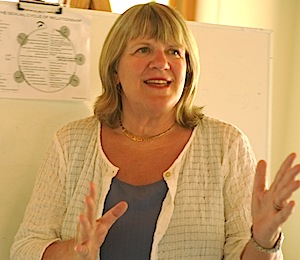 new partner. It’s as though a veil covers our rational brain, and all we can see is what is magical about this person and the relationship. In this first stage, we tend to see only the good, the similarities, the possibilities.
new partner. It’s as though a veil covers our rational brain, and all we can see is what is magical about this person and the relationship. In this first stage, we tend to see only the good, the similarities, the possibilities.
The seductive power of this stage may also cause us to fall in love with an inappropriate partner. With consciousness and effort, we can choose what to do with our feelings. Do we fan the flames of a potentially dangerous fire, or do we control our passion and turn our attention elsewhere?
Even if our partner is a good match, this will not eliminate the difficulties and annoyances that any two human beings bring to each other. If we choose to move with our partner into Stage Two, Doubt and Denial, we wake up from the trance of infatuation and begin to wonder whether this relationship is really the best choice for us. We find that our feelings of love are becoming more conditional, and power struggles are cropping up. We wonder if our partner has changed.
What then? We can choose to look carefully at our partner and assess their ability to collaborate, manage conflict and disappointment, and accept responsibility for their choices and troubles. Can we feel strongly attracted to someone and yet admit to ourselves that this person is not a good choice for us? If so, are we able to say no to the relationship?
During this second stage, the spotlight shines on the flaws of our beloved. We now invest a lot of energy in getting our lover to become the ideal partner we thought they would be. At the same time, we also catch glimpses of our own least likeable parts — for example, how we react when our partner doesn’t agree with us. Research clearly shows that managing conflict effectively requires something other than fighting, fleeing, or freezing. Can we learn these new skills?
Each of us is forced to give up our dream of perfect, unconditional love in which our partner always sees the best in us, says the right thing, never embarrasses us, and reads our mind so that they can please us in every way possible.
As our disappointment escalates, so do our biological responses to stress: we prepare for war, retreat, or don camouflage. Welcome to the third stage: Disillusionment. As differences continue to emerge, our proclivities to defend and preserve ourselves may grow even stronger: we may believe that we’re always in the right and that everything should be done our way. Alternatively, those of us who cannot bear conflict shut our ears to every dissonant chord and pretend that everything is wonderful — or at least tolerable.
The point is, we choose how to respond, and we continue to make choices as we move through love’s stages. As Disillusionment sets in, we can try our best to offer goodwill and kindness, even as tension thickens. As the “Why aren’t you me?” argument gathers momentum, we can consciously decide to loosen up a bit and allow more than one truth to be present in the relationship.
In this third stage, when our brain signals major alarm, it is particularly vital to choose to move from reactivity to rationality. When we are calmly present, we are free to act for the highest good of the relationship rather than out of fear and neediness.
Of course, because we’re thoroughly human, we won’t always respond to our lover from our highest selves. Then what? Can we apologize, make amends, and take responsibility for how we’ve behaved, despite what our partner has done to upset or annoy us? We have the power to make that choice.
Let’s say that when we reach the fourth stage — Decision — we make the choice to part ways. Can we wish our former partner the best? If that’s too hard, can we at least not wish them the worst?
If we decide to remain together, we have the opportunity to learn the lessons that will help to make us the best person we can be, while also giving 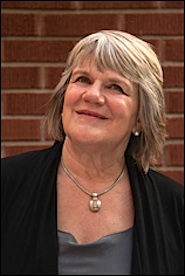 our relationship the chance to grow and deepen. This is where we enter the fifth stage, Wholehearted Loving. No longer two halves trying to make a whole, we are two complete people learning about love. Passion, safety, and generosity return to the relationship, along with humor and empathy.
our relationship the chance to grow and deepen. This is where we enter the fifth stage, Wholehearted Loving. No longer two halves trying to make a whole, we are two complete people learning about love. Passion, safety, and generosity return to the relationship, along with humor and empathy.
From the Inside Out
Some of us are lucky enough to enjoy a strong connection with the same partner for a long stretch. But regardless of the quality of our intimate relationship, our emotional and spiritual life journey begins and ends within us. In this sense, every relationship is an inside job. Inside us is where it starts — and where it finishes, too.
# # #
Linda Carrol, MS, is the author of Love Cycles: The Five Essential Stages of Lasting Love. A couple’s therapist for over thirty years, she is certified in Transpersonal Psychology and Imago Therapy and is a master teacher in Pairs Therapy. She lives in Corvallis, Oregon, offers workshops across the country, and is a frequent speaker at Rancho La Puerta in Tecate, Mexico. For booking information, visit our website, or give me a all at 503-699-5031.
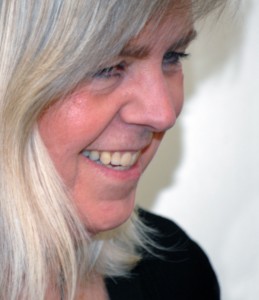 For Your Well Being is published bi-weekly. We bring you insider speaker reports, exclusive stories about special events around the country, meeting planner tips, and fun stuff from the worlds of health and well being. Be well and be in the know!
For Your Well Being is published bi-weekly. We bring you insider speaker reports, exclusive stories about special events around the country, meeting planner tips, and fun stuff from the worlds of health and well being. Be well and be in the know!
The Speak Well Being Group is a specialized speakers bureau, focusing on speakers for hospital-sponsored community events, healthcare organizations, nurses, conferences and women’s groups. Our speakers are hand-selected. They are not only experts in their fields, they connect with their audiences while bringing them life-changing information, smiles of recognition and ultimately a sense of well being and hope.
Finding the perfect keynote speaker for your special event or conference is my personal passion, not just once, but year after year. It brings me great joy to know that your audience was delighted and moved by the speaker we selected together. I’m committed to making the process easy, pleasant and fun.
